Ease rural distress to avoid child marriages
Karnataka has seen a distressing rise in the number of child marriages over the past few years, prompting the government to set up a task force to keep this trend in check. There was an alarming spike during the Covid years—from 111 cases reported in 2019-20 to 276 in 2020-2021 and 418 in 2021-22. It was a 300 percent jump in three years, while the national average increase was only 34 percent. A drought has now worsened the situation; crop loss and lack of employment are driving families out of villages into cities and many parents prefer to get their daughters married before migrating out.
The phenomenon is prevalent in districts across the state, with high numbers reported from Chamarajanagar, Bidar, Hassan, Yadgir and Raichur, and even from the more progressive and prosperous districts of Mysuru and Mandya. Ballari district has task forces in all taluks to keep a vigilant eye on such marriages. Between April 2017 and March 2022, the Karnataka government received tip-offs on 10,352 attempts of child marriage and managed to prevent 9,261 of them. In 2021-22 alone, 2,819 complaints were filed, pointing to the distress during the pandemic. Conviction under the Prohibition of Child Marriage Act of 2006 attracts a jail term and a heavy fine, but the conviction rate is merely one in ten, encouraging parents to conduct such nuptials in secrecy.
It is disheartening that the girl child has to bear the brunt of circumstances—first the pandemic and now a natural calamity is robbing young girls of their childhood and education. The number of school dropouts shot up during the pandemic and this disruption in education too led to a rise in child marriages. Hapless parents turn to marriage as a means to ease their own burden, compounded by poverty, illiteracy and superstition. Early marriages have a lifelong impact on the health of child brides who are forced to become mothers early, leaving them weak and vulnerable. While it is surprising that such a practice is on the rise in a literate state like Karnataka, it is bound to set rural society back by many decades. It is the responsibility of both the government and civil society to put an end to this trend. The government must come up with measures to alleviate rural distress and ensure that all girls are back in the classroom.

